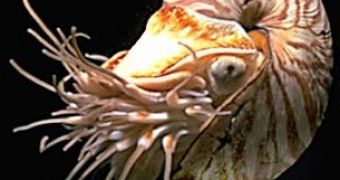As opposed to other cephalopods, the Chambered Nautilus has a relatively small brain and according to a new experiment it may have a simple memory as well, just enough to remember a particular event that took place several hours back, such as a flash of light that is associated with food.
"We were quite surprised to see memory at all. Because their brain is so simple and because it lacks the dedicated learning regions of octopus and cuttlefish and squid it had been implied they would have some deficits in learning and memory", says Robyn Crook, a marine biologist from the Brooklyn College. It was previously believed that nautiluses do not require a working memory for their daily life.
Nautiluses are a species of shelled cephalopods that evolved very little since they appeared several hundred million years ago. They spend most of the day wandering in the depth of water at about 300 meters, coming nearer to the surface during nighttime to feed on the dead sea life. Its cousins however, squids and octopuses, have much larger brains allowing them to engage in hunting and preying on creatures throughout the ocean.
In their experiment, Crook, assisted by her colleague Jennifer Basil from the City University, learned nautiluses to associate flashes of light with water. Another group was trained without providing them with any rewards to act as control. "Like a snail's eye they pop out and go in", Crook says. Then, they were tested to see how they would react without providing them with their tasty snack.
In 24 hours after the training session, the nautiluses appeared to show interest in the flash of light, although half an hour later they stopped reacting to it altogether. Nautiluses trained between 3 to 12 hours showed some signs of memory, although the next day all memory seemed to have disappeared, displaying a short and long-term memory pattern similar to those of other cephalopods, most likely related to food.
"If their memory is limited to one day it means that any information they got on one excursion would have to be used that one night", said cephalopod expert from the Marine Biological Laboratory Roger Hanlon.
More evolved cephalopods have brain structures dedicated for memory, but when it comes to nautiluses scientists have no idea how they form memories. Further investigating this process could unravel some interesting aspect of how intelligence evolved.
"It's really pioneering research. We've been underestimating them", says Jennifer Mather, a psychologist from the University of Lethbridge in Alberta. She believes that the memory in nautiluses is related to mating.

 14 DAY TRIAL //
14 DAY TRIAL //